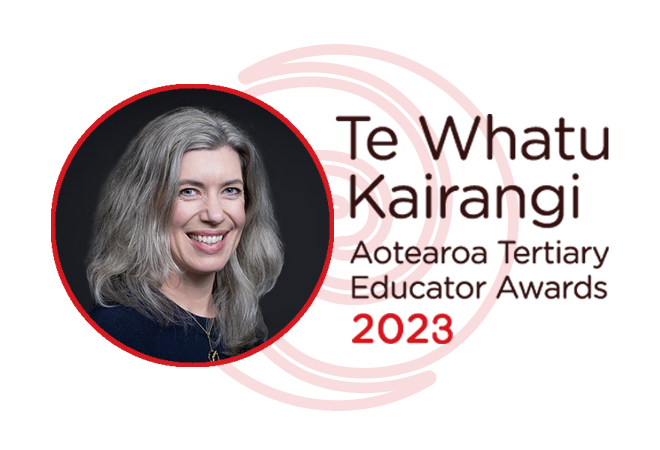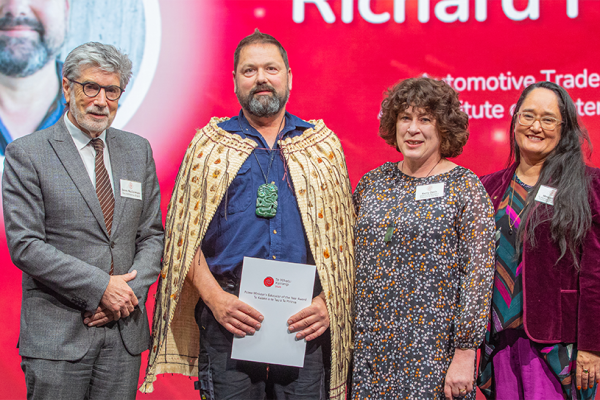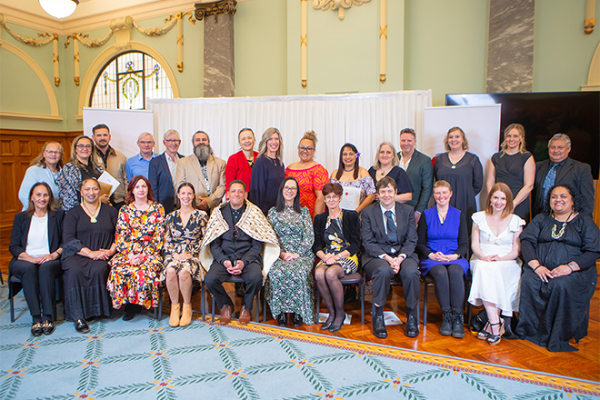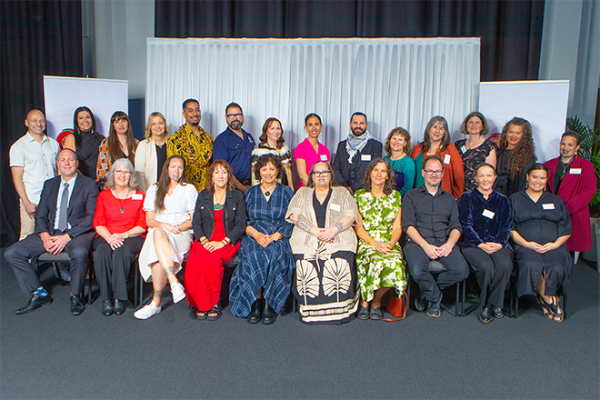Associate Professor Kate Schick
Inclusion and community at the heart of Kate’s practice
Category Winner | Achieving diversity and inclusion
Associate Professor in Political Science and International Relations Te Herenga Waka | Victoria University of Wellington.
Watch Associate Professor Kate Schick's Teaching profile video
“A cornerstone of my teaching is inclusivity: I am intentional about ensuring that the diverse range of ākonga who take my classes feel welcomed.”
Kate Schick is Associate Professor of International Relations at Te Herenga Waka—Victoria University of Wellington. She has been permanently employed in the Political Science and International Relations Programme since February 2009.
Kate’s relational pedagogy developed in response to her desire to preserve communal small-group deep learning in the context of large upper undergraduate and postgraduate classes. She creates relational learning environments that exemplify the TES’s core objectives of centring learners and reducing barriers to education for all ākonga, facilitating caring and inclusive pedagogical communities that foster deep learning. Rather than including students into a fundamentally unchanged mainstream classroom environment, Kate has transformed the way that she teaches, centring relationships, community and care.
Her relational pedagogy centres ako, the idea that we all learn from and teach one another, and whanaungatanga, the sense of community that we build by being together. As a result, ākonga come to better understand themselves and their world(s) through relational engagement as they embark on learning journeys with their peers.
Over the past eight years, Kate has formalised her relational approach to teaching via the use of ‘micro-communities of learning’. Ākonga are pre-assigned to groups of approximately eight ākonga and their learning happens primarily in these small groups. Ākonga reflect, write, discuss, and present in their groups. To enable ākonga to come to know and trust one another requires a lot of work – organising and adjusting groups, being clear about the kaupapa of the course, and giving space for community building. Through that trust, ākonga become increasingly willing to be vulnerable with one another, ask questions on a deeper level, and engage with intellectually and politically challenging material. In community, they uncover their own critical capabilities and experience transformative learning.
A cornerstone of her teaching is inclusivity. She is intentional about ensuring that the diverse range of ākonga who take her classes feel welcomed. She draws on years of professional development to integrate Mātauranga Māori into her teaching philosophy and practice. She starts classes with karakia, integrates te reo Māori and Māori and Pasifika content, and encourages ākonga to bring their own identities and culture in conversation with the course content via research and creative projects.
Kate works to ensure all ākonga can succeed in her classes, with a particular focus on those whom mainstream education often fails. As the parent of a dyslexic child, she is particularly attuned to the need to support neurodiverse learners and learners with disabilities. She seeks to provide alternative modalities of content, assessment and class design that are better suited for neurodiverse learners than traditional models of education.
Examples of practices that are inclusive of neurodiverse learners include offering course content via pre-recorded short video lectures and ensuring that all required readings are available as audio texts. Kate also provides creative project options and self-reflection essays as alternatives to traditional assessment formats. Her classroom design incorporates periods of reflection prior to discussion as well as ensuring student presentations take place in small groups with people they know and trust.
Micro-communities have been central to Kate’s relational pedagogical practice for many years. After every trimester, ākonga tell her the opportunity to learn in the context of micro-communities has made them feel part of a meaningful community and has transformed their thinking. Ākonga highlight this ‘superb’, ‘fantastic’, ‘passionate’ and ‘engaging’ approach, saying that it proactively welcomes diverse students and perspectives, is inclusive of different learning styles and ākonga with disabilities, and facilitates learning via community.
“The structure of the course reaffirmed what it was teaching: we learn from each other, we learn from dialogue, we learn from being vulnerable enough to express how something made us feel. I am so grateful for the opportunity to sit with a group of people (whether in person or online) and just discuss these big ideas, all of us changing and growing simply through discussing them.” (Student feedback 2021)
Kate’s adoption of micro-communities of learning is particularly valuable for Māori and Pasifika ākonga. This relational pedagogy includes whanaungatanga (relation and belonging) and manaakitanga (care), which are important for enhancing Māori learner success, as well as Pacific learner success.
From 2020, Kate has offered a ‘creative option’ for assessment in lieu of a final essay for her Critical Global Politics paper. Students can engage with course thinkers and themes via creative media and accompanying critical reflection. In 2021, for instance, students created mōteatea (traditional chant), triptych of painted kōwhaiwhai, creative dialogue, poetry, visual media, and a Pacific textbook that incorporated tapa cloth and weaving. This option allows students to more explicitly bring their own identities and cultures into dialogue with the course themes and means Indigenous students can express their learning using modalities specific to their cultures. By extending their learning beyond the essay form, students engage thoughtfully not only with the course content but also with peers, families and mentors, who they often ended up discussing their projects with and learning from during the process.
“This project was deeply personal for myself as it was about my iwi and my tupuna…[it] extended my own personal understanding of my hapu, whakapapa and whenua.” (Student feedback 2021)
In recognition of Kate’s sustained contribution to the teaching and learning of International Relations, she was jointly awarded the British International Studies Association Award for Distinguished Excellence in Teaching International Studies (2022). She was also awarded the Victoria University Teaching Excellence Award (2022) and Most Popular Lecturer in the Faculty of Humanities and Social Sciences award (2011).
Kate is committed to the dissemination of her relational pedagogical practice beyond the classroom. She exercises leadership/hautūtanga in teaching by actively sharing her innovative practice and research on critical and creative pedagogies within and beyond Aotearoa. Her teaching practice has garnered international and national recognition via international conferences and workshops and pedagogical publications with international presses.
“Kate exemplifies the phrase ‘servant leadership’ in the way that she supports her colleagues’ teaching development (colleagues both within and beyond the university).” (Peer feedback 2022)
Kate’s relational teaching practices are sustainable and increasingly widely adopted – she has been using and refining micro-communities since 2016 and the practice is replicable across teaching modalities (in person, online and blended learning) and disciplines (peers in the arts and sciences have adopted the model with great success). She actively shares her teaching approach and practice locally, nationally and internationally. Winning this national award will enable her to further widen her community of practice, giving her the opportunity to learn from other exceptional teachers and to share her relational practice more widely across Aotearoa and beyond.



